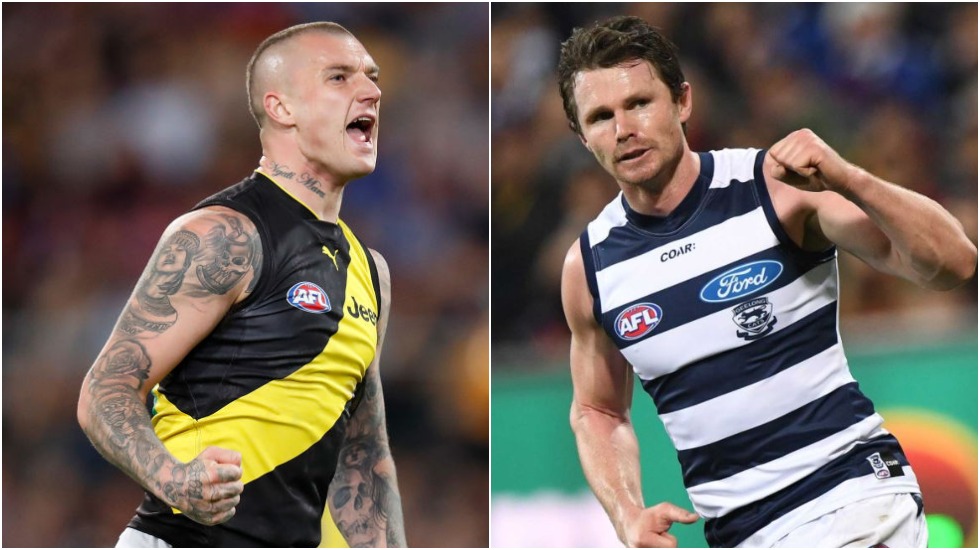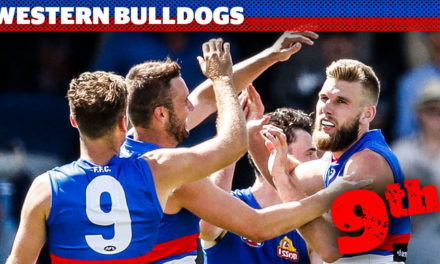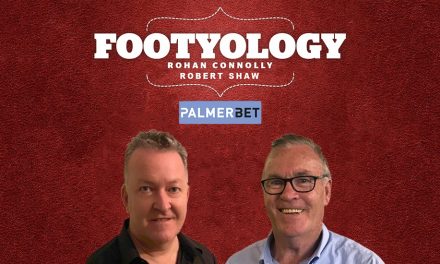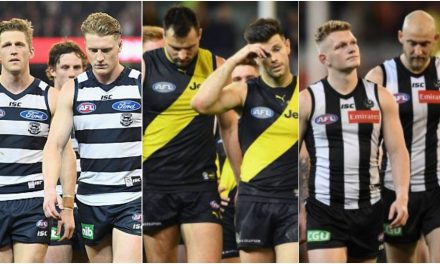Dustin Martin and Patrick Dangerfield. Two superstars of genuine heavyweight grand final teams. Photos: GETTY IMAGES
For what seemed an eternity as the logistics of this most unusual AFL season were thrashed out, we were asking whether the eventual premier would forever carry an asterisk beside its name.
And yet, come late Saturday night, whether it’s Richmond or Geelong, it’s far more likely to be an exclamation mark.
Is that hyperbole? I don’t think so. It’s also one of the few occasions in my professional career I’ve been delighted to be able to say I was wrong.
I was certainly one of the sceptics early on. Too many compromises to competition integrity with a shortened schedule, shortened games, a compacted fixture and surrendering of home grounds, I felt. Not to mention the aesthetics of, as was being seriously discussed, a grand final in December.
With the accompanying background noise about the extent of the financial calamity were we not to have a season at all, it all seemed a bit unseemly, and the quick grabs from coaches about “greatest premierships” given the logistical difficulties a little too manufactured.
I’m certainly not prepared to declare Saturday’s flag winner anything like “greatest”. But I suspect strongly we’re going to hear a steady trickle of post-season stories about the difficulties “clubs in hubs” endured which give us all a better idea of the extent of obstacles either the Tigers or Cats had to climb on their way to the flag.
Not the likes of incidents involving Richmond pair Sydney Stack and Callum Coleman-Jones or Sydney’s Elijah Taylor. But the toll on mental health to which Collingwood coach Nathan Buckley alluded recently, or North Melbourne coach Rhyce Shaw’s current struggles.
Hub life, for Richmond and Geelong, has now extended to well over 100 days, three times the initial estimates of just over 30 with which they thought they’d be dealing with.
Football clubs and players particularly, crave routine. And never have the routines of professional sportsmen been thrown out the window in such dramatic fashion as 2020.
That the two grand finalists have been able to perform to any sort of level at all, let alone in recent weeks recover from potentially morale-sapping first-up finals defeats to scramble back on to the grand final stage, is remarkable enough even before they win or lose in this last concerted effort.
There’s also a compelling argument that way events have unfolded in season 2020 have given the determining of the premiership team even greater legitimacy in terms of competition integrity.
Those who (and with some justification) bemoan the loaded AFL fixture in which teams normally play 12 opponents once and just five twice can have far fewer grumbles this year with every side playing every other just the once pre-finals.
And so, by virtue of the two teams playing off, has the home and away factor been largely removed as a potential “leg-up”.
I wouldn’t have had any quibbles at all with the rights of either Port Adelaide or Brisbane to be competing for a premiership on Saturday.
PLEASE HELP US CONTINUE TO THRIVE BY BECOMING AN OFFICIAL FOOTYOLOGY PATRON. JUST CLICK THIS LINK.
But had either won their preliminary finals, we would surely already this week have heard much debate about that advantage, given the grand final would have been the Lions’ 12th game out of 20 played on its home deck, while Port Adelaide also got to play just on half its games at home.
Richmond and Geelong’s success this season would have been even more satisfying for both clubs given they are the two Victorian clubs subjected most to bleating about their normal home ground advantage.
Since its re-emergence as a heavyweight in round six of 2007, Geelong has won a staggering 92 of 103 (or just on 90 per cent) of games played at Kardinia Park, an edge which popular argument has gone has inflated its ladder finish and thus explained its finals disappointments.
The Tigers clearly love the MCG. Since their amazing resurgence in 2017, they’ve won 42 and drawn another of 49 games there (or 86 per cent) including, obviously, two grand finals against non-Victorian teams.
Well, they don’t get to play off for a premiership on it this year. And have graced their favourite ground just four times all season, for only two victories, too.
Collectively, the Tigers and Cats have played just seven times in 40 games at home in 2020. A win on Saturday would be a good antidote to popular wisdom as well as adding another trophy to the cabinet.
Which is another reason there’s a genuine grand final buzz around this contest. Take this season as just another chapter in a modern-day premiership novel, and this is a clash of true heavyweights on the scale of Ali v Frazier.
Even if it loses on Saturday, Richmond remains clearly the best team of the past four seasons. A third flag in four seasons will give it officially the mantle of owning (behind hat-trick winners Brisbane and Hawthorn) the third-most successful era football has seen since the Hawks between 1988-91.
Geelong, meanwhile, in terms of total games won, is the standout team not only of the 21st century, but the entire AFL era.
The Cats have missed finals just once in the past 14 seasons, won three flags, played in four grand finals and 10 preliminary finals. It’s been a phenomenal run. Frank it with a fourth premiership, and only Hawthorn, with five, will stand above Geelong (and West Coast) in the most obvious measure of AFL-era greatness
You don’t get better bona fides than those the Tigers and Cats will take on to the Gabba on Saturday evening. And you won’t find two grand finalists who have negotiated not only as many, but as unexpected hurdles to get there.
Only a few short months later, any talk of asterisks beside the 2020 premiership team’s name seems ridiculous as well as insulting. And whoever prevails, far from an afterthought, will be a team likely in years to come to be hailed louder than most of its predecessors.
This article first appeared at ESPN.












Agree with this very much, Rohan.
But do disagree that this would put Richmond ahead of Geelong 2007-2011 for greatness. (Hopefully the Cats will make sure that talk gets squashed!)
The Hawks, Lions and Cats played 4 grand finals for 3 wins each, so even if the Tiges win, they’re still a grand final short. The Lions and Hawks only kept their dynasty going for 4 years. Cats did it for 5. Tiges are up to 4. However, I do think they’re better placed to emulate the Cats and come back for a 5th year, esp if they lose this year.
It’s a shame the Cat lost in 2008. It was one of the biggest steals ever – which even forced the AFL to change the rules to prevent it happening again.
I think it cost Saints the 2009 flag too. How different could history be if there’d only been 3 or 4 rushed behinds instead of 11, and those 7 or 8 turned into goals? If Cats 2008 then Saints back to back 2009-2010?
And no “KennettCurse”? (Tho I always believe it was the “Rushed Behinds Curse”. Especially given it lasted… 11 games!)
(Note, given that the time between the 2008 and 2012 Hawks grand finals is 4 years, and includes missing finals in 2009, I don’t count it in the Hawks dynasty as it was quite a different team by the time 2012 came around. Only 10 players were in both the 2008 and 2012 GFs.)